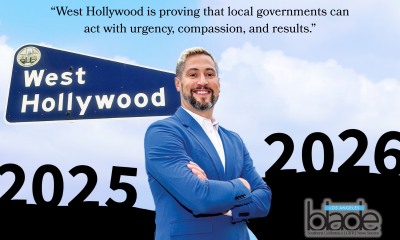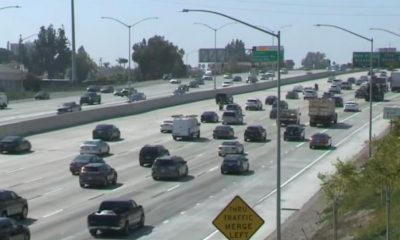West Hollywood
West Hollywood in brief- City government in action this week
Older Adults Health Fair, May is Mental Health Awareness Month, Foster Care Panel Discussion, Kings Street Design Concept Plan plus more
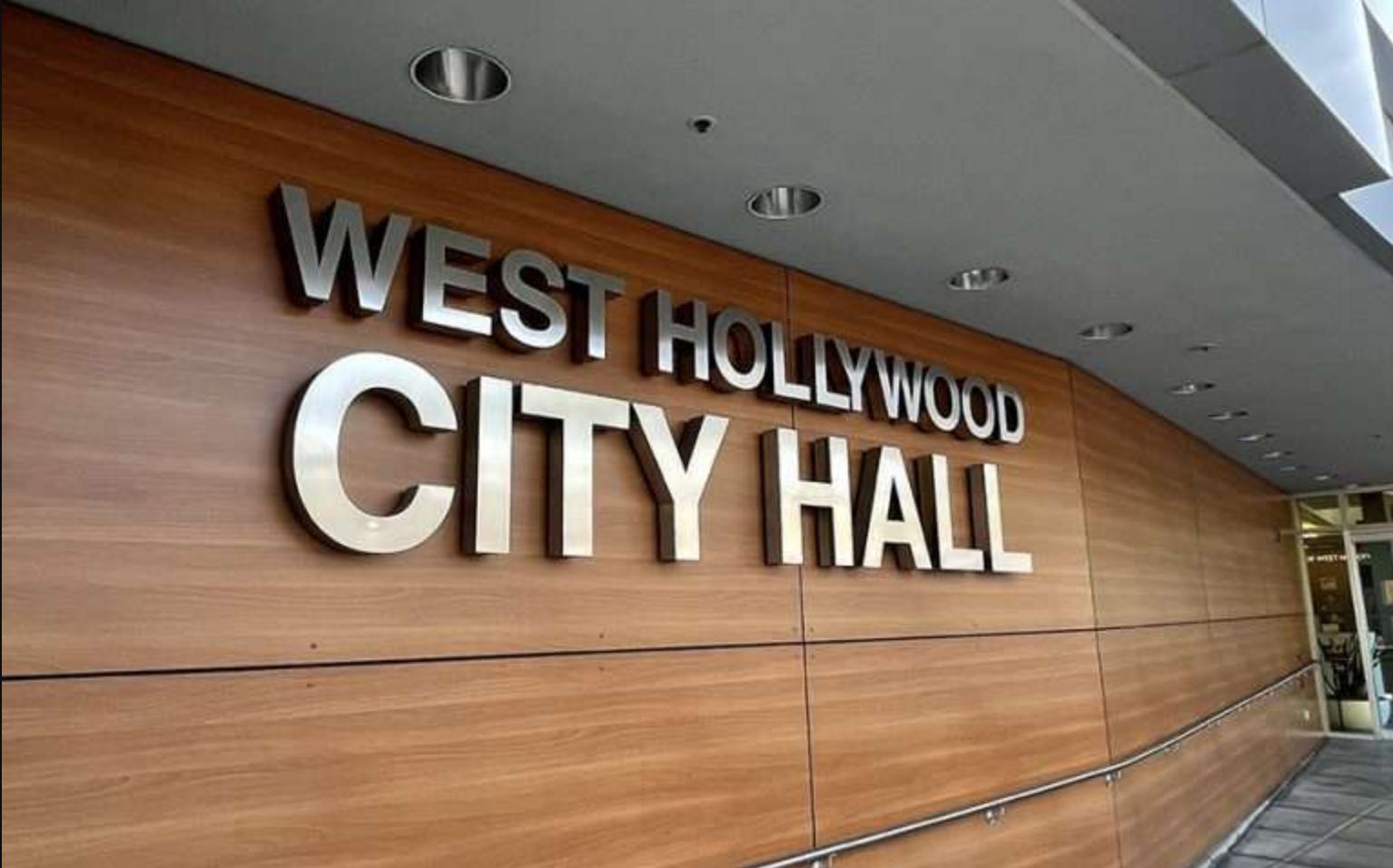
Older Adults Health Fair on Tuesday, May 21 at Plummer Park
WEST HOLLYWOOD – To celebrate Older Adults Month, the City of West Hollywood will host its 19th Annual West Hollywood Older Adults Health Fair on Tuesday, May 21, 2024, from 10 a.m. to 1 p.m. at Plummer Park’s Community Center, located at 7377 Santa Monica Boulevard. Admission is free; no RSVP is required.
The Older Adults Health Fair is a no-cost event co-sponsored by Cedars-Sinai and Jewish Family Service LA. The event will feature health screenings, information from more than 25 health and social services community partners, vaccinations, a Human Library activity, complimentary lunch while supplies last, giveaways, and more. Local organizations will provide health and social services information, Cedars-Sinai will conduct health screenings, and the Los Angeles County Department of Public Health will administer COVID-19 and flu vaccinations.
Limited free parking is available at the Plummer Park parking lots, located at 7377 Santa Monica Boulevard and Fountain Avenue/ N. Vista Street at the north end of the park. There are also paid parking meters in the surrounding area.
The City of West Hollywood provides free transportation to Plummer Park through its Cityline service. Cityline is a friendly and accessible alternative to the larger bus system and all shuttles are ADA-accessible. Cityline operates Monday through Saturday from 9 a.m. to 6 p.m. and shuttles arrive approximately every 30 minutes. For additional information and a detailed route map, visit www.weho.org/cityline — route maps are also available on Cityline shuttles and at West Hollywood City Hall, located at 8300 Santa Monica Boulevard.
For more information about the Older Adults Health Fair, please contact Becca Lubin, City of West Hollywood Strategic Initiatives Program Administrator, at (323) 848-6518 or at [email protected].
For people who are Deaf or hard of hearing, please call TTY (323) 848-6496.
May is Mental Health Awareness Month
The City of West Hollywood joins organizations and mental health advocates across the nation in recognizing the month of May as Mental Health Awareness Month, a time to work together to fight stigma, provide support, educate the public, and advocate for policies that support the millions of people living with mental illness and their families.
In commemoration of the month, from Wednesday May 15, 2024 through Wednesday, May 29, 2024, West Hollywood City Hall will be lit green, the color of recognition for mental health awareness month.
Mental Health Awareness Month began in the United States in 1949 and was started by Mental Health America (MHA). Mental illness affects more than 50 million people in the United States. According to the National Association of Mental Illness (NAMI), one in five U.S. adults experiences a mental health condition each year. Annually, mental illness affects; 16% of Asian adults; 21% of Black/African American adults; 18% of Native Hawaiian/Pacific Islander adults; 21% of Hispanic adults; 27% of American Indian/Alaska Native adults; 24% of White adults; 35% of multiracial adults and 50% of LGBTQ adults.
The impacts of mental health challenges are significant among youth. One in six U.S. youth experiences a mental health condition each year, and only half of them receive treatment. Data also shows that mental health treatment, i.e. therapy, medication and selfcare has made recovery a reality for most people from mental illness. People receiving treatment in a given year are 47% of adults with mental illness, 65% of adults with severe mental illness and 51% of youth (6-17) with a mental health condition. Last year 56% of lesbian, gay, bisexual, and transgender adults with a mental health diagnosis received treatment or counseling.
Mental Health Action Day was founded to shift mental health culture from awareness to action. Now in its fourth year, this global movement is powered by a growing coalition of more than 2,300 nonprofits, leading brands, government agencies, and cultural leaders that spread the message that, just like our physical health, we can take actions to improve our mental health. This year’s call to action is to dedicate one hour to social connection. For more information about how to participate in Mental Health Action Day go to www.mentalhealthaction.network.
If you are experiencing a mental health crisis, connect to the 988 Suicide and Crisis Lifeline 24/7 by calling or texting 988 or connect to emergency community services by calling 211. The 988 Suicide & Crisis Lifeline (formerly known as the National Suicide Prevention Lifeline) provides free and confidential emotional support to people in suicidal crisis or emotional distress 24 hours a day, 7 days a week, across the United States.
Those in need of mental health support or connections should reach out to the following resources for assistance:
- APLA Health – West Hollywood provides individual and group therapy sessions to assist with a variety of concerns including depression, anxiety, grief, and trauma. Contact (213) 201-1369 or visit https://aplahealth.org/
- Didi Hirsch Mental Health Services provides counseling, psychiatric services, medication support and substance abuse programs at various sites. Contact the 24/7 Crisis Line: (800) 273-8255 or (888) 807-7259 or visit www.didihirsch.org.
- Jewish Family Services Comprehensive Service Center provides social services programming for seniors and people with disabilities that includes counseling, psychiatry, and case management. Contact (323) 851-8202
or visit www.jfsla.org. - Los Angeles County Department of Mental Health (DMH) directly operates more than 80 programs and contracts with more than 700 providers who provide a spectrum of mental health services to people of all ages. Contact the 24/7 Help Line at (800) 854-7771, or text “LA” to 741741 to be connected to a crisis counselor via text message, or visit https://dmh.lacounty.gov/.
- Los Angeles LGBT Center’s Mental Health Services team provides counseling, group support, addiction recovery, and psychiatry services for LGBT and non-LGBT individuals for issues including depression, anxiety, domestic violence/intimate partner violence, and substance use. Contact (323) 993-7669 or visit www.lalgbtcenter.org.
- Maple Counseling provides free and low-cost comprehensive mental health services to individuals of all ages, couples, and families. Contact (310) 271-9999 or visit www.maple4counseling.org.
- The National Alliance on Mental Illness (NAMI) provides free education, support, and advocacy. The NAMI Westside Los Angeles Chapter can be reached by contacting (310) 889-7200 or visiting www.namila.org.
- The National Coalition Against Domestic Violence (NCADV) website at www.ncadv.org offers comprehensive and inclusive information for all about warning signs of domestic and intimate partner violence and abuse, including psychological abuse, and how to get help. NCADV runs the National Domestic Violence Hotline website at www.thehotline.org, which offers immediate help to everyone 24/7/365 via the “chat now” button on the website or by calling (800) 799-SAFE (7233) or texting LOVEIS to 22522, and for people who are Deaf/hard of hearing: (855) 812-1011 (VP) or (800) 787-3224 (TTY).
- Saban Community Clinic provides individual therapy and support groups for stress, anxiety, and more to help develop practical coping skills. Contact (323) 653-1990 or visit www.sabancommunityclinic.org.
- The Trevor Project provides confidential and free crisis counseling, information & support to LGBTQ young people 24/7, all year round. Contact (866) 488-7386, or text 678-678, or via online chat at www.thetrevorproject.org.
The City of West Hollywood’s Human Services Division website area provides information about available local mental health services and resources at https://www.weho.org/services/human-services/mental-health or contact staff at (323) 848-6510.
The City of West Hollywood’s Recreation Services Division provides information about quality leisure service experiences that promote health and wellness at https://www.weho.org/community/recreation-services including the City’s Be Well WeHo program designed to support physical and mental health at any age.
For more information about the City of West Hollywood’s recognition of Mental Health Awareness Month, please contact Larissa Fooks, the City of West Hollywood’s Community Programs Coordinator, at (323) 848-6413 or at [email protected].
For people who are Deaf or hard of hearing, please call TTY (323) 848-6496.
City of West Hollywood will Host a Foster Care Panel Discussion
The City of West Hollywood will host a free panel discussion that will focus on the effective practices and challenges within the foster care system and the transformative power and compassion of fostering.
The panel discussion will take place on Tuesday, May 21, 2024 at 6:30 p.m. at the City of West Hollywood’s Council Chambers/Public Meeting Room, located at 625 N. San Vicente Boulevard. It aims to bring further awareness to issues impacting foster youth during May, which is National Foster Care Awareness Month. The panel will bring together diverse perspectives including professionals who work to support the foster youth population in various capacities.
The discussion will be moderated by Dawn McCoy, a children’s advocate and founder of the Loving Way Foundation. The Loving Way Foundation’s mission is focused on ending child abuse through advocacy, awareness, and visibility while bettering the lives of impacted children.
Panelists will include:
- Bonnie Sharpe, Director of Programs at Extraordinary Families, whose mission is to help children and youth in foster care to have the childhoods and futures they rightfully deserve.
- Mario Gonzalez, Academic Services Manager at Foster Love whose mission is to improve the lives of children in foster care by providing essential resources and educational opportunities.
- Jody Giles, Director of Philanthropy at Catalyst Family Office, an organization that supports philanthropic endeavors to help drive meaningful change.
- Nova Bright-Williams, Head of Internal Training, Learning & Development, at The Trevor Project whose mission is to provide lifesaving and life-affirming services to LGBTQ young people.
- Shiré Wortham, Social Worker at Alliance for Children’s Rights whose mission is to protect the rights of children in poverty and those overcoming abuse and neglect by delivering free legal services, supportive programs, and systemic solutions.
May marks National Foster Care Month, a pivotal time to raise awareness regarding the needs of more than 391,000 children and young individuals within foster care. The month is a time to raise awareness of issues related to foster care and acknowledge the parents, family members, foster parents, child welfare, and related professionals, mentors, policymakers, and other community members of the community who help children and youth in foster care find permanent homes and connections.
National Foster Care Month is also an opportunity to raise awareness about the overrepresentation of LGBTQ youth in child welfare, 30% of whom identify as LGBTQ. LGBTQ youth who face family rejection and maltreatment are often forced out of their homes, or will run away, become homeless, or enter the foster care system.
For more information, please contact Jennifer Del Toro, the City of West Hollywood’s Community and Legislative Affairs Supervisor, at (323) 848-6549 or at [email protected].
For people who are Deaf or hard of hearing, please call TTY (323) 848-6496.
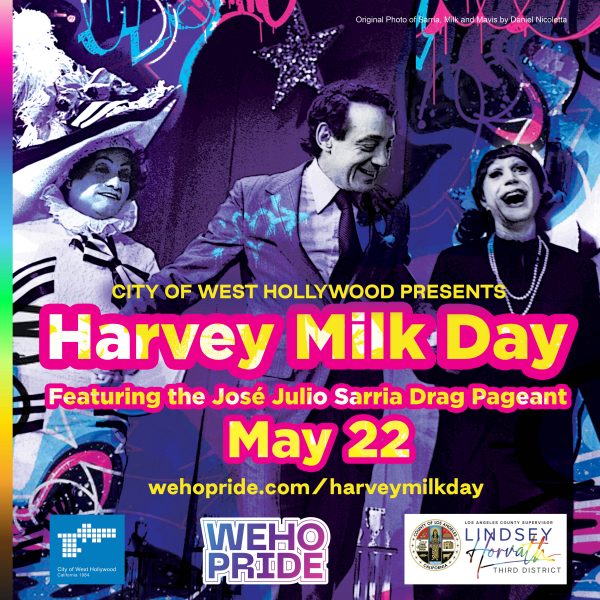
City of West Hollywood will Kick Off WeHo Pride Season Beginning on May 22, Harvey Milk Day
Each year, the City of West Hollywood celebrates the artistic contributions of the LGBTQ community by kicking off WeHo Pride season with an annual Harvey Milk Day event.
On Wednesday, May 22, 2024 at 6 p.m. Pride Starts Here with the second annual José Sarria Drag Pageant. The event is organized by the City of West Hollywood and West Hollywood Drag Laureate Pickle and is co-sponsored by the Imperial Court and by Los Angeles County Supervisor Lindsey P. Horvath, Third District. It will take place at the West Hollywood Park Aquatic and Recreation Center Respite Deck, located at 8750 El Tovar Place, adjacent to West Hollywood Library. The event is free to attend; advance RSVPs are requested at https://HarveyMilk2024.eventbrite.com.
José Sarria was the first openly gay person to run for office in the United States, helped pave the way for Harvey Milk’s successful run for office, was a well-known drag performer under the name the Window Norton, and founded the International Imperial Court System, which is one of the oldest and largest LGBTQ organizations in the world. The Drag Pageant competition will be hosted by West Hollywood Drag Laureate Pickle, and several drag icons will be honored. Judges will include Queen Mother Karina Samala and Emperor Eugene Maysky of the Imperial Court, Landon Cider, Anil Patel, Nyx, and Kyra Jete.
In addition to the Drag Pageant, the event will include a voter registration table, a Harvey Milk photo opportunity, and typewriter poetry provided by Pride Poets. Pride Poets is a cohort of LGBTQ poets who create custom poetry for the public on typewriters. Pride Poets was founded by former West Hollywood City Poet Laureate Brian Sonia-Wallace for the City’s LGBTQ Arts Festival in 2019. The participation of Pride Poets in this event is funded by a City of West Hollywood Arts Grant.
For nearly four decades, the City of West Hollywood has been home to one of the largest Pride celebrations in the nation. Hundreds of thousands of LGBTQ people and allies from around the world traditionally make West Hollywood their regular destination during Pride season.
WeHo Pride Weekend will take place from Friday, May 31, 2024 to Sunday, June 2, 2024 and, in addition to the WeHo Pride Parade, will include the free WeHo Pride Street Fair; WeHo Pride Presents Friday Night at OUTLOUD; the OUTLOUD Music Festival; the Women’s Freedom Festival; the Dyke March; and more. The WeHo Pride Arts Festival will take place from Friday, June 14, 2024 to Sunday, June 16, 2024. WeHo Pride celebrations will include a diverse array of LGBTQ community group programming from May 22 to June 30 as part of visibility, expression, and celebration.
The WeHo Pride Arts Festival is organized by the City’s Arts Division. The City of West Hollywood is committed to providing accessible arts programming for residents and visitors and the City’s Arts Division delivers a broad array of arts programs including Art on the Outside (temporary public art), Urban Art Program (permanent public art), Summer Sounds, Winter Sounds, the WeHo Reads literary series, Free Theatre in the Parks, Arts Grants for Nonprofit Arts Organizations, Library Exhibits and Programming, the City Poet Laureate Program, Drag Laureate, Drag Story Hour, Human Rights Speakers Series and the WeHo Pride Arts Festival Weekend. For additional information, please visit www.weho.org/arts.
Additional information about WeHo Pride 2024 is posted at www.wehopride.com. OUTLOUD Music Festival information is posted at www.weareoutloud.com. Follow @wehopride on Instagram and Facebook and follow @officiallyoutloud on Instagram and Facebook. Sign up for WeHo Pride text updates by texting “Pride” to (323) 848-5000.
Since its incorporation in 1984, the City of West Hollywood has become one of the most influential cities in the nation for its outspoken advocacy on LGBTQ issues. No other city of its size has had a greater impact on the national public policy discourse on fairness and inclusiveness for LGBTQ people. Home to the “Rainbow District” along Santa Monica Boulevard, which features a concentration of historic LGBTQ clubs, restaurants, and retail shops, the City consistently tops lists of “most LGBTQ friendly cities” in the nation.
More than 40 percent of residents in West Hollywood identify as LGBTQ and four of the five members of the West Hollywood City Council are openly gay. The City has advocated for nearly 40 years for measures that support LGBTQ individuals and the City is in the vanguard of efforts to gain and protect equality for all people on a state, national, and international level. #WeHoPride @WeHoCity
For more information about the City of West Hollywood’s José Sarria Drag Pageant on Harvey Milk Day or about the WeHo Pride Arts Festival, please contact the City of West Hollywood’s Arts Coordinator, Mike Che, at (323) 848-6377 or at [email protected] or visit www.wehopride.com/artsfestival.
For people who are Deaf or hard of hearing, please call TTY (323) 848-6496.
‘Willoughby, Vista/Gardner, and Kings Street Design Concept Plan’ Informational Open House at Plummer Park on May 21
The City of West Hollywood invites community members to attend an upcoming Informational Open House to learn more about the Willoughby, Vista/Gardner, and Kings Street Design Concept Plan. The purpose of this in-person open house is to provide community members with detailed information regarding the Street Design Concept Plan and share an overview of the project’s steps taken to-date and next steps, moving forward.
The Informational Open House will take place on Tuesday, May 21, 2024, at 6 p.m. at the Plummer Park Community Center in Rooms 1 and 2, located at 7377 Santa Monica Boulevard. Drop-in; no advance RSVP is needed. Light refreshments will be served.
The City of West Hollywood’s mobility projects are guided by the adopted Pedestrian and Bicycle Mobility Plan, which advocates for comfortable, safe, healthy, and convenient places to walk and bicycle in the context of a balanced, multimodal transportation network serving pedestrians, bicyclists, transit riders, and motorists of all ages and abilities.
The Street Design Concept Plan was identified as a priority project in the Pedestrian and Bicycle Mobility Plan, and it launched in 2019. The project’s primary objective is to enhance the neighborhood and protect the safety of both pedestrians and cyclists through strategic street improvements across the corridor. This comprehensive streetscape initiative aims to create safer, more accessible routes for walking and biking while effectively reducing cut-through traffic. By transforming Kings Road and Vista/Gardner Streets into key connecting corridors, the Street Design Concept Plan facilitates a seamless link between residential and commercial areas and east-west routes like Santa Monica Boulevard and Fountain Avenue. This connectivity not only supports a healthier, more active community but also promotes environmental sustainability and enriches local quality of life.
The Street Design Concept Plan is the first project stage in the development of the Willoughby, Vista/Gardner, and Kings Street Design Capital Improvement Project. With the recent approval of the Street Design Concept Plan by the West Hollywood City Council, the Plan now moves forward to the Design & Engineering Phase, where concepts will be developed in much more detail. This includes the development and incorporation of detailed engineering plans, specifications, and cost estimates that will serve as the blueprint for project construction. The next stage of the project will determine the feasibility of the conceptual project elements from the Street Design Concept Plan and allow for additional insight into any refinements that may need to be incorporated into the project’s final design.
The Community Engagement and Plan Development Process to date has included:
- The Willoughby, Vista/Gardner, and Kings project was identified in the Pedestrian and Bicycle Mobility Plan adopted in 2017, and outreach on the Concept Plan for these streets began with a visioning workshop in Summer 2019.
- The project was delayed due to COVID-19 pandemic restrictions, but in August 2022 the City hosted two community virtual workshops. Feedback and survey responses guided recommendations.
- In 2022, demonstration projects were installed along Willoughby as an alternative way to share ideas and provide community input.
- In addition to the community workshops, staff also met with residents to share information about the project. City staff attended multiple update meetings with the City of Los Angeles, including Council District 5 and the Mid-City West Neighborhood Council.
- As part of the demonstration project and community workshops in 2022, Here LA and the City’s WeHoTV collaborated to put together an engagement video to help community members envision potential street changes and improvements.
- In April 2023, based on feedback from the community, City staff finalized the report and recommendations to include protected bike lanes along Vista/Gardner, except for the two blocks between Fountain and Lexington, which were excluded due to the potential loss of parking along this segment.
- Staff presented these recommendations to the Transportation & Mobility Commission in June 2023, and the Commission expressed its support.
- In November 2023, the West Hollywood City Council directed staff to develop a policy to include protected bike lanes on all roadway projects. Following this directive, staff developed a protected bike lane option for Gardner between Fountain and Lexington.
- In March 2024, staff presented the Street Design Concept Plan to the West Hollywood City Council with two options for Gardner between Fountain and Lexington, including one with the addition of protected bike lanes.
The City of West Hollywood will be providing additional community outreach opportunities, moving forward, to refine concepts as part of the upcoming Design & Engineering Phase. In particular, the City will be looking for ways to address issues of concern, including minimizing impacts to on-street parking.
For additional information about the Street Design Concept Plan, please visit the Engage WeHo information and feedback page, which is located at https://engage.weho.org/willoughby.
For more information, please contact Bob Cheung, City of West Hollywood Senior Transportation Planner, at (323) 848-6346 or at [email protected].
For people who are Deaf or hard of hearing, please call TTY (323) 848-6496.
******************************************************************************************
For up-to-date information about City of West Hollywood news and events, follow @wehocity on social media, sign-up for news updates at www.weho.org/email, and visit the City’s calendar of meetings and events at www.weho.org/calendar. West Hollywood City Hall is open for walk-in services at public counters or by appointment by visiting www.weho.org/appointments. City Hall services are accessible by phone at (323) 848-6400 and via website at www.weho.org. Receive text updates by texting “WeHo” to (323) 848-5000.
West Hollywood
John Heilman and Danny Hang will serve as WeHo’s new Mayor and Vice Mayor
Last night, community members and local officials gathered to celebrate new leadership and bid a warm farewell to outgoing Mayor Chelsea Byers.
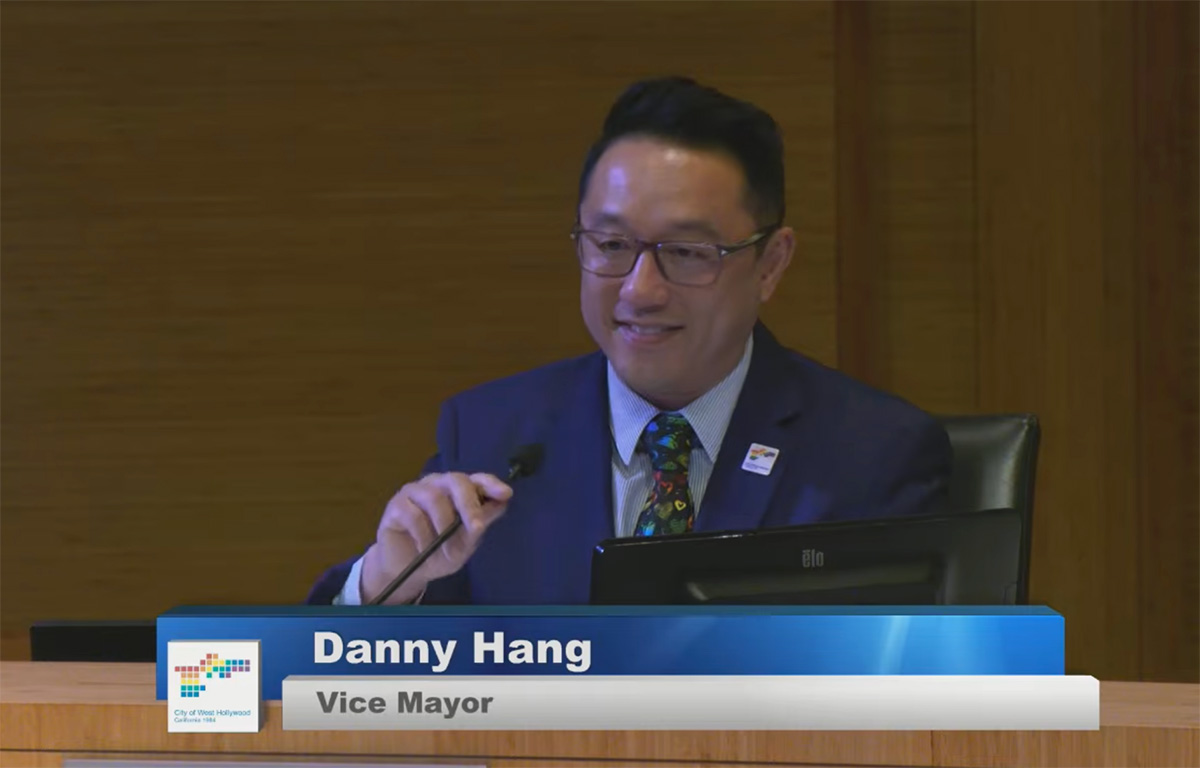
On Jan. 12, West Hollywood residents packed the City’s chambers at 6 p.m. to honor the work of outgoing mayor Chelsea Byers and witness councilmembers John Heilman and Danny Hang take their oath of office as they respectively assume their roles as Mayor and Vice Mayor for 2026.
In her last address as Mayor, Byers spoke about the optimism she holds onto in these unsteady times. To her, West Hollywood is a unique City: one that has become a model for what can be possible in an unjust society. “It’s us against the world. It’s West Hollywood on the stage,” Byers said. “It’s our story to tell, and every single person here contributes in such great ways to that.”
Byers was awarded a plaque on behalf of West Hollywood council members for her outspoken commitment to LGBTQ+ rights, economic justice, housing affordability, and policies that emphasize equity and inclusivity in West Hollywood.
Her leadership remains a bright, guiding light for Mayor Heilman, who was part of West Hollywood’s first city council after the independent city was incorporated in 1984. The spirit of that initial group remains today: queer, progressive, and led for and by the people. Yesterday’s ceremony marked the beginning of Heilman’s ninth time serving as Mayor, as well as his last year on the city council due to term limits.
Now, he leads side-by-side with a self-proclaimed “newcomer,” Danny Hang.
From the 626 to the Westside: Hang’s roots and journey
Hang was born in Monterey Park, a city in the San Gabriel Valley. The region is known for its diverse communities and AAPI-rich culture and history, and Hang recounted to the Blade the deep sense of belonging and comfort he felt growing up there. “I could go to a restaurant, speak Vietnamese or Chinese,” Hang said. “There are people who look like me out there. It is my home away from home.”
After college, he worked at the Social Security Administration, where he helped retirees, disabled people, and those impacted by loss file for Supplemental Security Income (SSI). The work was fulfilling, and he loved feeling that he had a tangible impact on others’ lives: that he could help residents grappling with difficult bureaucratic processes.
This passion grabbed the attention of L.A. County Supervisor Lindsey Horvath, who tapped Hang into serving on West Hollywood’s Disabilities Advisory Board in 2017. Hang eagerly accepted the role, having always been drawn to the vibrant, queer cultural hub. “WeHo was always the land of the unicorn: the land of magic,’ Hang told the Blade. “[This] was a town where I could be open, by myself, and find other people who were also LGBTQ+.”
After serving on the City’s Disabilities Advisory Board and, subsequently, the county’s Business License Commission, Hang noticed a lack of AAPI representation in local leadership. “There aren’t many AAPI people at all in West Hollywood. After I was on the commission, [I thought]: Hey, I think I want to run for city council,” Hang told the Blade.
Creating more inclusive leadership in WeHo
In 2024, Hang was elected to West Hollywood’s city council, becoming the first AAPI councilmember in the City’s 40 year legacy. “I want to see people who look like me in local government, because I want this community to be reflective of the modern-day people who live here. We’re a diverse community, and there’s no reason why we shouldn’t have people of color on the council, as well as more people of color appointed to our boards and commissions.”
Last night, local officials offered encouragement, support, and affirmation to Hang after he took his oath of office. “You’re already making history and certainly making waves across, not just your home region of the San Gabriel Valley, but certainly in California,” said Monterey Park councilmember Henry Lo.
Afterwards, Hang addressed the room, thanking residents, fellow council members and his family. “Standing here as the first AAPI elected to the West Hollywood City Council is deeply meaningful, and I couldn’t have done it without my parents. [They’re] right here in the front row,” Hang said. “My dad was a union worker, who showed me why standing up for workers matters. And my mom worked in a small business, owning a little nail salon in South Pasadena. She taught me what it means to care for others and to keep the community going.”
The year ahead: Heilman calls for residents to unite
Afterwards, Mayor Heilman spoke at length about the upcoming transitional year, the urgency of the current political climate, and ways that community members can step up to support each other. In his last term, he has set his eye on revitalizing the Sunset Strip, stabilizing rent and increasing housing affordability as well as examining the safety of the City’s foundational buildings, including the library and fire station.
He concluded his speech by making an unwavering stance on the “appalling” state of the federal government, stating that every West Hollywood resident must step up together in the face of ongoing federal attacks on the rights of LGBTQ+ people, specifically transgender people, as well as immigrants and other marginalized community members.
“This is a direct attack on our residents. It’s a direct attack on all of us,” Heilman said. “Now is not the time to hide. We need you…Ask what you can do to help people in the community,” he said, galvanizing residents to volunteer for the City’s various social services, nonprofits like Hollywood Food Coalition and Ascencia.
This call for unity and communal bravery echoes Byers’ belief in the courage of the people of West Hollywood. “41 years ago, a group of people defined what government could be,” Byers said. “We’re living the wildest dreams of people decades ago…and we get to be a bridge for that hope for the future. In such a critical moment, it’s truly our responsibility.”
Kristie Song is a California Local News Fellow placed with the Los Angeles Blade. The California Local News Fellowship is a state-funded initiative to support and strengthen local news reporting. Learn more about it at fellowships.journalism.berkeley.edu/cafellows.
West Hollywood
Administration refused to honor World AIDS Day; residents gathered with defiance, grief and love
Yesterday, members of the APLA Health Writers Group read moving stories to a large group of locals gathered at the AIDS monument.
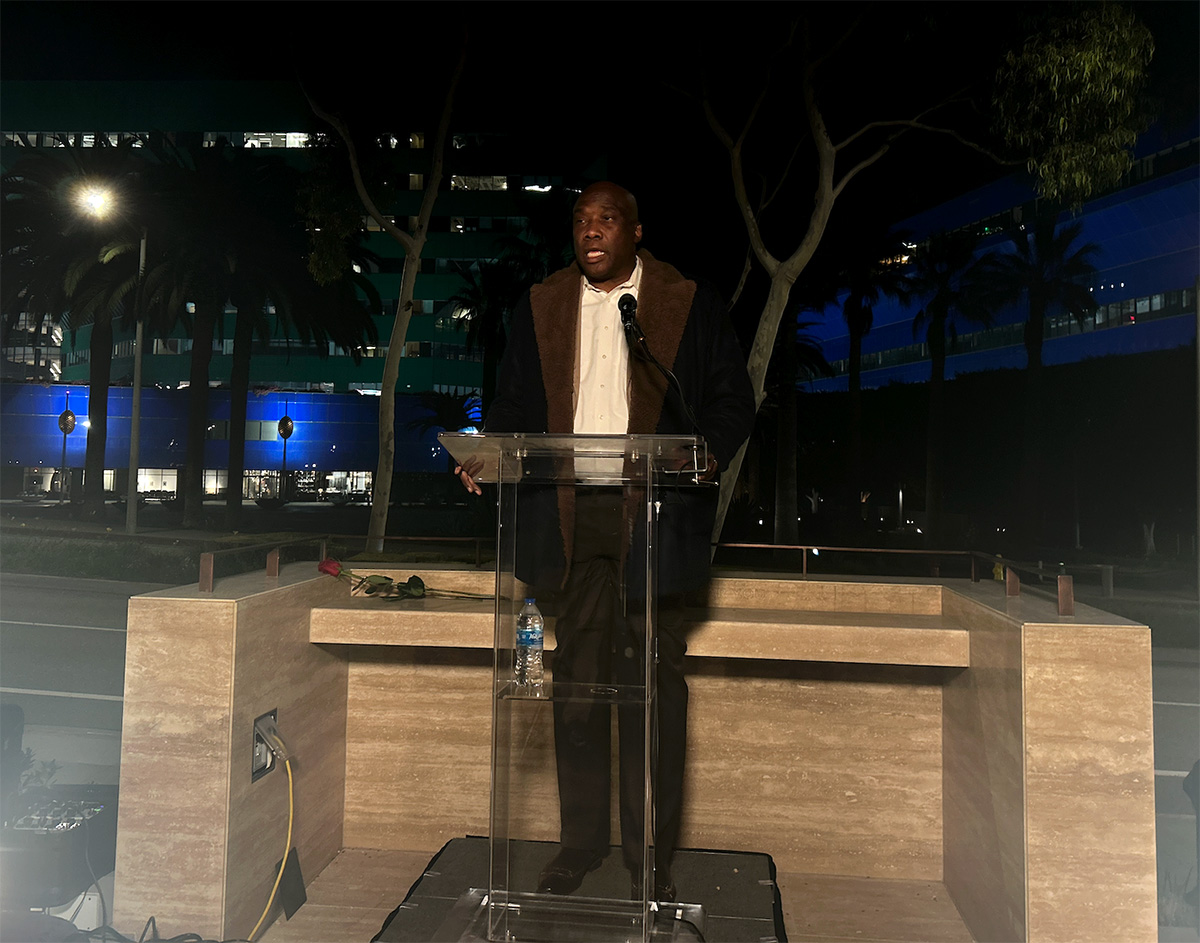
On Monday, the federal administration did not honor World AIDS Day, for the first time since the international awareness day was created in 1988. In addition to significant funding cuts to organizations focusing on HIV preventative treatment and care, the government’s halting of this commemoration perpetuates a dismissive system of inaction against LGBTQ+ people.
And yet, over 50 community members filled the empty spaces of West Hollywood’s AIDS monument yesterday evening, waiting in the night chill as city officials delivered impassioned statements and writers from APLA Health read personal pieces that centered a grief and love for those lost to the epidemic.
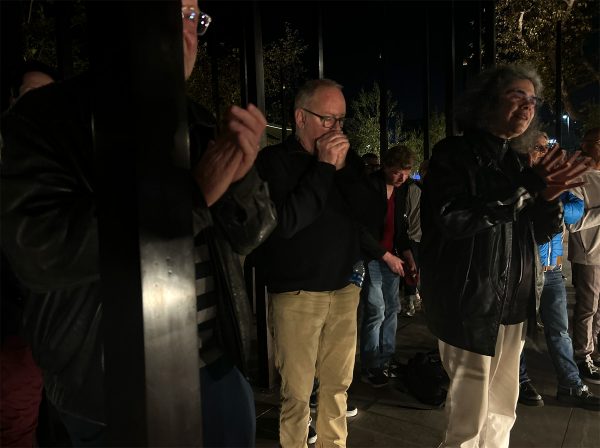
Before the readings began last night, West Hollywood vice mayor John Heilman asked for residents to join him in a righteous rage against administrative apathy. “I want to ask us all to reflect for just a moment about all of the people we lost…I want us to reflect and get angry,” said Heilman. “We have a fucking president who won’t even recognize World AIDS Day.”
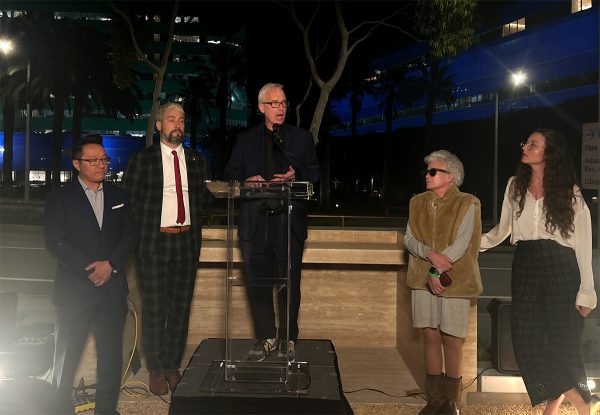
Irwin Rappaport, board chair for STORIES: the AIDS monument, echoed this immense disappointment. “Many of us here tonight lived through the 1980s, so we know what that’s like,” Rappaport said. “We also know that because of that neglect, because of that lack of caring from the federal government, we have to care for one another — and we know how to do that. When we don’t have recognition from others, we know how important it is to preserve our own history, to tell our own stories.”
Through heavy silence, five writers from APLA Health’s writers group stood tall before a podium and shared intimate writings they created about the epidemic and its personal impact on them. The collective was established in 1989 to provide an inclusive, expressive space for HIV-positive writers and allies to work on their writing and learn how to share their stories.
Writer Brian Sonia Wallace, who served as West Hollywood’s poet laureate from 2020 to 2023, has been working with the writers group for the last four years to help them hone and refine their narrative voices as they share their heaviest grief and the depths of their love for the people they lost to HIV and AIDS.
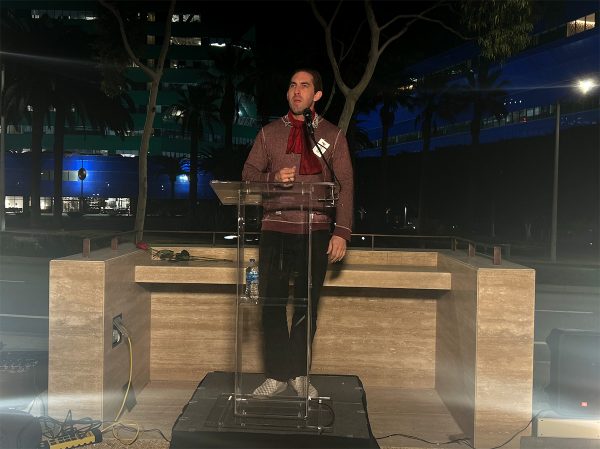
Hank Henderson, one of these writers, read from a diary entry from November 29, 1991. His voice, clear and strong, wavered as he shared about the death of his dear friend Richard. In a piece filled with lush, rich detail, painted clearly with a strong and loving voice, Henderson recounted a memory with Richard during the latter’s last years.
“The Santa Barbara sky is clear blue forever today…Yesterday came and went like a half-remembered dream between snooze alarms,” Henderson recited. “Last year, we walked to the beach. We spent hours there, played frisbee ourselves, brought the dog. Richard even yelled out 30-minute tanning turnover alarms. Yesterday, he took tiny, labored steps back to the car, used my shoulder to keep himself from falling over. Nobody said anything. We just pretend it’s normal.”
Another writer, Austin Nation, shared the story of being told he was HIV-positive at 26 years old. As a young nurse, he remembered the shock of seeing “young, beautiful men” arriving at the hospital covered in “purple, blotchy sores.” When he received his own test results, a paralyzing terror washed over his body. An incredulity followed the fear: why was this happening to him? “I got this thing for what?” Nation spoke. ”For having fun? For making love? And now it’s gonna cost me my life?”
But as he stood before the crowd, now 63 years old, he was met with applause and joy as he stated and repeated: “I’m still here. I’m still here.” The writers, in their grief and loss, have come to a place where they are able to share these stories, empowered and held. “In a world that writes off people with stories like mine,” Nation said. “It’s a hell of a good day to be alive.”
Kristie Song is a California Local News Fellow placed with the Los Angeles Blade. The California Local News Fellowship is a state-funded initiative to support and strengthen local news reporting. Learn more about it at fellowships.journalism.berkeley.edu/cafellows.
West Hollywood
West Hollywood kicks off community-focused programming for World AIDS Day
Since 1988, queer communities have come together on Dec. 1st to honor siblings and allies lost to the AIDS epidemic.
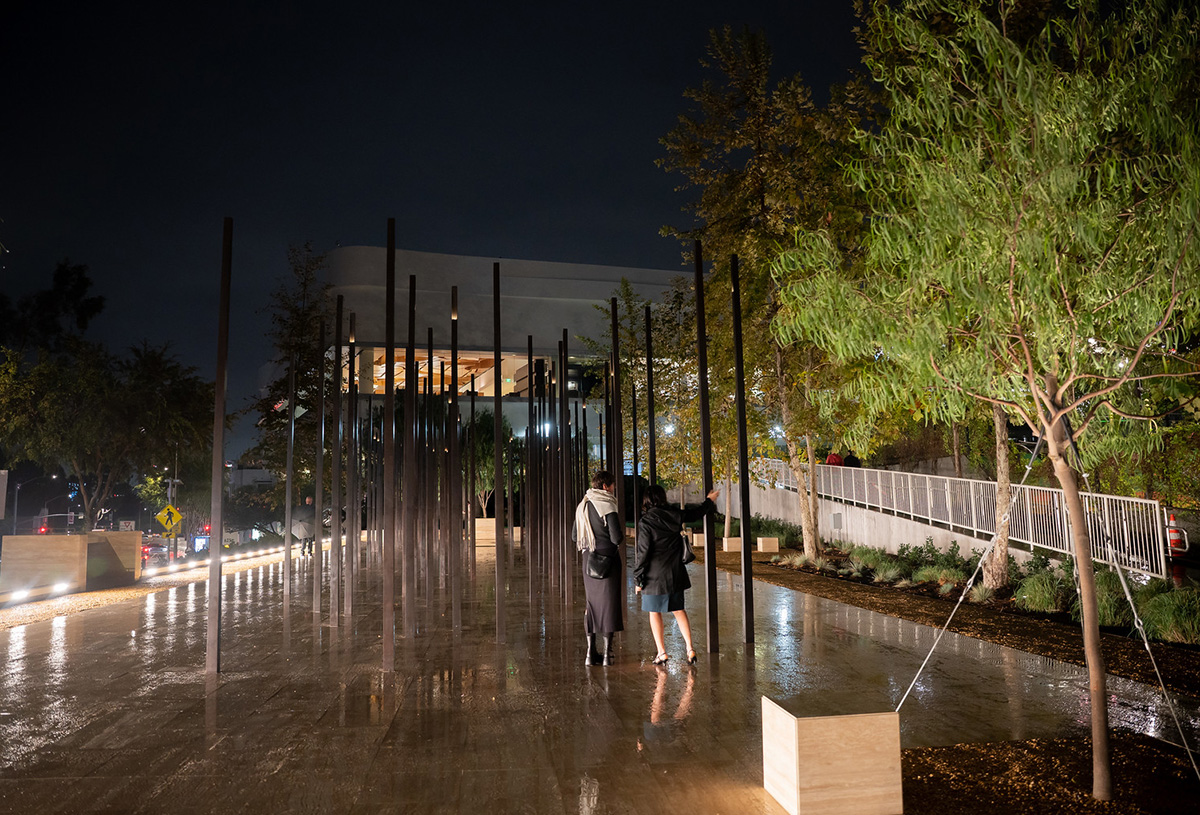
Since 1988, LGBTQ+ communities have come together on Dec. 1st to commemorate queer siblings and allies lost to the AIDS epidemic. This year’s World AIDS Day follows the theme “Overcoming disruption, transforming the AIDS response” and highlights the substantial funding cuts to research, health services, and community initiatives that have prioritized the safety of people with HIV and AIDS. The theme challenges people to think about “radical” ways to organize together and ensure that those who are impacted are able to access the care, treatment, and awareness that they need.
Beginning today, the City of West Hollywood is kicking off programming to recognize the historical transformation that local queer communities experienced during the AIDS epidemic. A panel from the AIDS Memorial Quilt will be available for viewing at the City’s Council Chambers at 625 N. San Vicente Boulevard through Monday, Dec. 15th.
Known as the largest community arts project in history, the Quilt is a powerful memorialization of loved ones who died during the epidemic. Each panel of the Quilt contains a story of remembrance, immortalizing a life cut short during the crisis. The project currently contains over 50,000 panels dedicated to over 110,000 people, all woven together in a 54-ton tapestry piece.
If you’re visiting the panel today, there will be an additional gathering opportunity tonight at the West Hollywood Park for STORIES: the AIDS Monument. From 5:30 to 8:30 p.m., members from the HIV-positive writers collective APLA Health Writers Group will present intimate readings that reflect on their experiences. Community members will be allowed time to wander through the monument and also preview the new Herb Ritts: Allies & Icons exhibition at ONE Gallery after the program. The art show includes striking black and white portraits of activists who stood in alliance with those most impacted during the AIDS epidemic.
Additionally, fresh flowers will be placed on the bronze plaques that line the City’s AIDS Memorial Walk. During the AIDS epidemic, West Hollywood was at the center of a rampant grief and loss that juxtaposed vibrant programming and efforts that boosted healing and fought against stigma and violence. It continues to be a vibrant space that houses various organizations and memorial spots that continue to uphold the revolutionary history and advocacy work that has continued since the epidemic’s beginnings.
Today, West Hollywood is in the process of executing its HIV Zero Strategic Plan, an initiative that began in 2015. Its goals include: expanding healthcare access for people living with HIV and AIDS, reducing the rate of infections, lessening health disparities and inequities for those impacted, and slowing the disease’s progress from advancing to AIDS.
According to West Hollywood mayor Chelsea Byers at a recent Cityhood event, the initiative carries forth the City’s “bold vision” and commitment to ensuring marginalized community members living with HIV do not face the life-threatening discrimination and health barriers that their elders experienced.
To learn more about the City’s programming, read here.
Kristie Song is a California Local News Fellow placed with the Los Angeles Blade. The California Local News Fellowship is a state-funded initiative to support and strengthen local news reporting. Learn more about it at fellowships.journalism.berkeley.edu/cafellows.
West Hollywood
Today, West Hollywood celebrates 41 years of queer cityhood
WeHo’s city officials are trying to preserve the fight for queer safety and rights that began decades before.
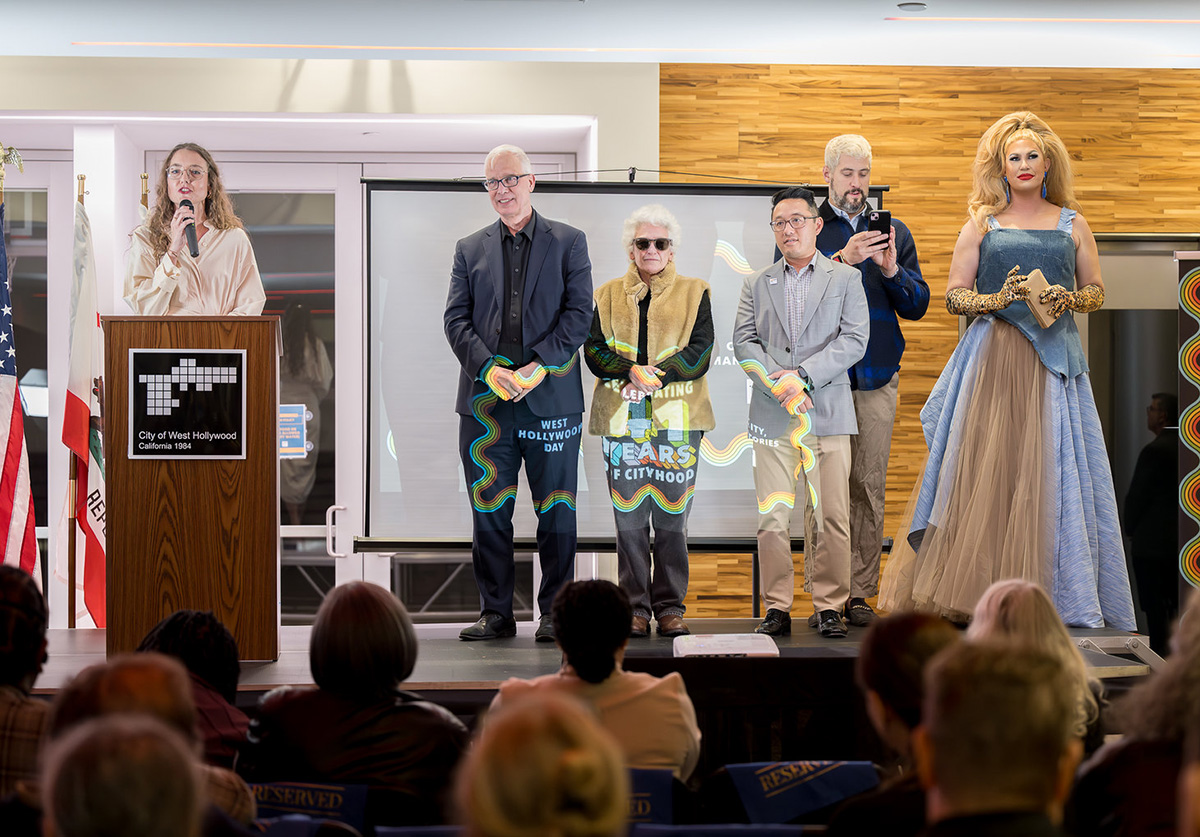
On Nov. 29th, 1984, West Hollywood was incorporated as an independent City, making its sovereignty official and solidifying it further as a sanctuary for LGBTQ+ community members, their stories, and their freedoms. Inspired by other prominent gay neighborhoods like New York’s West Village and San Francisco’s Castro District, West Hollywood was established by local queer advocates and residents. Their first city council was made up of a majority gay governing body — the first in the world, according to the West Hollywood History Center.
This political legacy, and the city’s vibrant and proudly queer history, continues to be preserved. On Monday’s celebratory event, West Hollywood mayor Chelsea Byers announced that the City’s current council “continues to be a majority-LGBTQ+ body,” holding tightly onto a “spirit” that reflects, prioritizes, and fights for Los Angeles’ queer community.
West Hollywood has been through various transformations, cocooning and revitalizing itself through the country’s evolving political and cultural upheavals. It has long been home to a ravishing nightlife that celebrates LGBTQ+ expression, and was a focal point for queer-led liberation and activism in the late 1960s and early 1970s. Trailblazers like Morris Kight led the first gay pride march through West Hollywood’s streets in 1970 and opened the Los Angeles LGBT Center to nourish the City’s robust and blossoming queer communities.
Today, West Hollywood continues to be the place where queer organizers and residents plant roots. Earlier this month, STORIES: the AIDS monument opened up in the City’s park after over a decade of work, shining a light on the legacies of gay activists, artists, historians, and community members who fought to survive as anti-gay stigma led to the erasure of their rights and lives.
As waves of anti-LGBTQ+ hate and violence continue to surge through the country, West Hollywood elected officials aim to continue doing the critical work that began decades before them: the work that protects the ability of queer residents to advocate for themselves, to live with protections and dignity, and to relish in joy. Mayor Byers is inspired by the resilience of the community members who stood together to establish this independent City in 1984. “The people who lived here…wanted a city with strong protections for renters, with progressive policies, and with a local government that would actually reflect and protect the people who call this place home,” said Byers, at the Nov. 24th celebration.
Over 40 years later, these needs have not changed. The way forward? Remembering and fighting for that initial promise and hope. “We are a chorus. We are a tapestry,” said Byers. “We are the product of thousands of people who, for more than four decades, have dared to say: We can build something better here.”
Kristie Song is a California Local News Fellow placed with the Los Angeles Blade. The California Local News Fellowship is a state-funded initiative to support and strengthen local news reporting. Learn more about it at fellowships.journalism.berkeley.edu/cafellows.
West Hollywood
From nickname to reality, the Rainbow District is made official by the City of West Hollywood
The mile along Santa Monica Boulevard from N. Doheny Drive to N. La Cienega Boulevard welcomes residents and visitors to come as they are
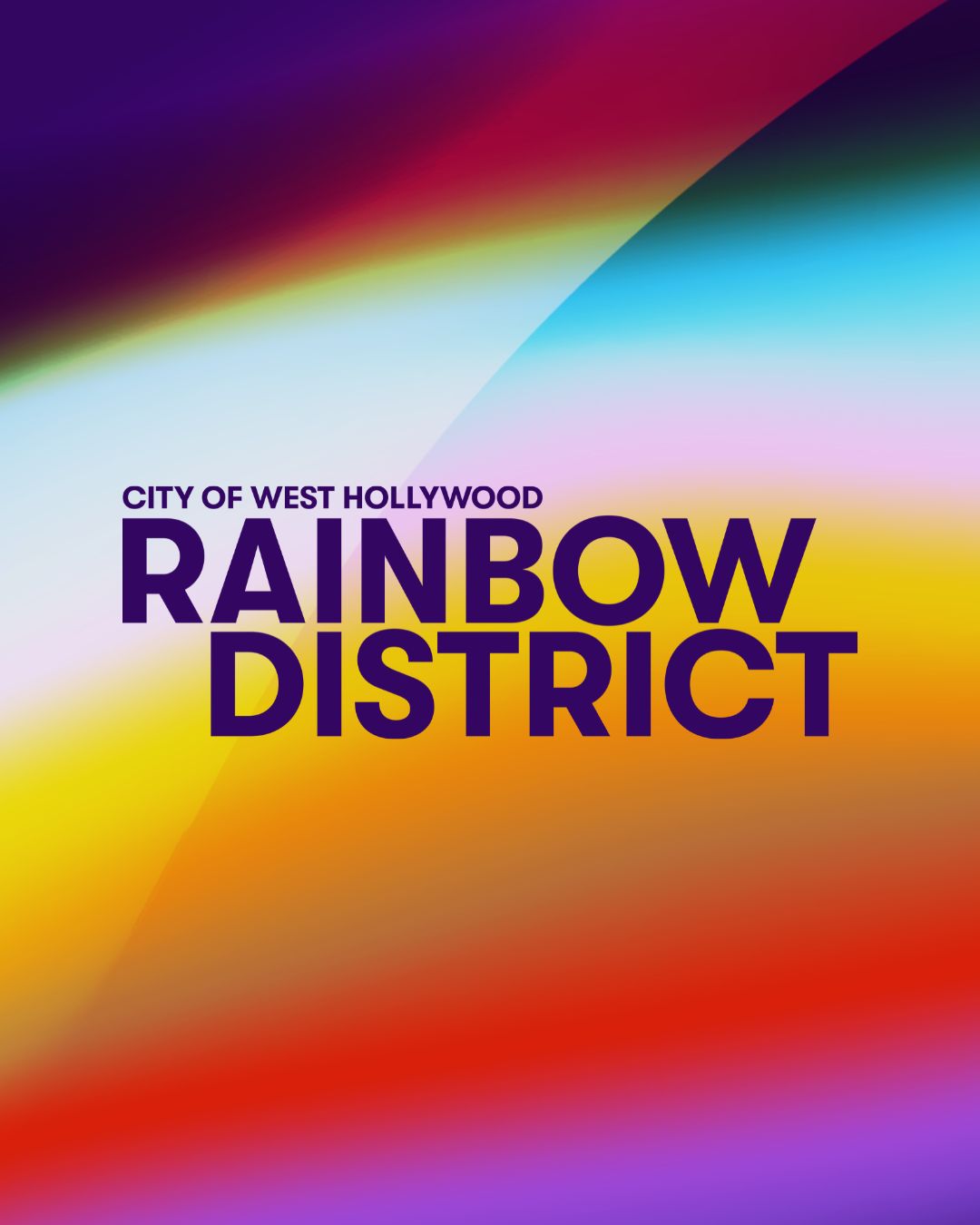
Even in today’s political climate, we will not be hidden.
The vibrant stretch on Santa Monica Blvd of over 50 local businesses, representing the full spectrum of LGBTQ+ expression, from N Doheny Dr to N La Cienega, has had the loving nickname of the Rainbow District for decades. Well, now it’s official. From nightlife to restaurants to community organizations, the City of West Hollywood has formally designated the space as such, honoring the neighborhood’s legacy as a safe haven for the queer community and beyond.
In addition to making the name official, the Rainbow District is being launched with a full range of social media, including Instagram, TikTok, and Facebook, keeping the residents and visitors updated on all upcoming events and happenings in the neighborhood.
Long known as a beacon of acceptance, inclusion, and visibility, where everyone is welcome, this iconic mile-long corridor is now formally recognized for what it has always been: a place where people from every walk of life can come together, be themselves, and celebrate the beauty of diversity.
City of West Hollywood Mayor Chelsea Lee Byers states, “For generations, the City of West Hollywood’s Rainbow District has been a place where LGBTQ+ people take their first steps into living openly, where the warm embrace of community is found at every turn, and where the joy of living out, loud, and proud fills the streets. The City’s official designation of the Rainbow District honors both the legacy and the future of this vibrant neighborhood, home to beloved entertainment venues, bars, and restaurants that have long served as cornerstones of LGBTQ+ life. Today, the Rainbow District is more alive than ever, and it will always stand as a beacon of hope, pride, and belonging and as a reminder that everyone deserves a place to celebrate joy, to be seen, and to be supported.”
The Rainbow District officially joins a nationwide list of iconic LGBTQ+ landmarks. West Hollywood will not be hidden amid political backlash and will continue to protect queer spaces, uplift queer voices, and foster a safe and joyful environment for all.
“This designation is not only a celebration, but it also serves as a promise,” said Visit West Hollywood President & CEO Tom Kiely. “A promise to keep LGBTQ+ spaces visible, valued, and vibrant for generations to come. As the Rainbow District continues to evolve, it will remain a place where locals and visitors alike can connect through culture, creativity, and community. The City’s formal designation affirms its significance and highlights The Rainbow District as the ultimate playground for travelers seeking a unique, inclusive, and authentic experience.”
The Rainbow District will be home to upcoming community events that include:
- Winter Market & Ice Skating Rink — December 2025
- Go-Go Dancer Appreciation Day — March 2026
- Harvey Milk Day — May 22, 2026
- WeHo Pride Weekend & the OUTLOUD Music Festival at WeHo Pride — June 5–7, 2026
Follow the Rainbow District on socials to discover local happenings, support small businesses, and be part of a neighborhood that celebrates every person for exactly who they are.
Instagram: @RainbowDistrictWeHo TikTok: @RainbowDistrictWeHo
Facebook: facebook.com/rainbowdistrictweho More Info: visitwesthollywood.com/rainbowdistrict
West Hollywood
West Hollywood’s AIDS Monument preserves the pain and power of people lost to the crisis
STORIES: The AIDS Monument is now available to view at West Hollywood Park, 15 years after its conception.
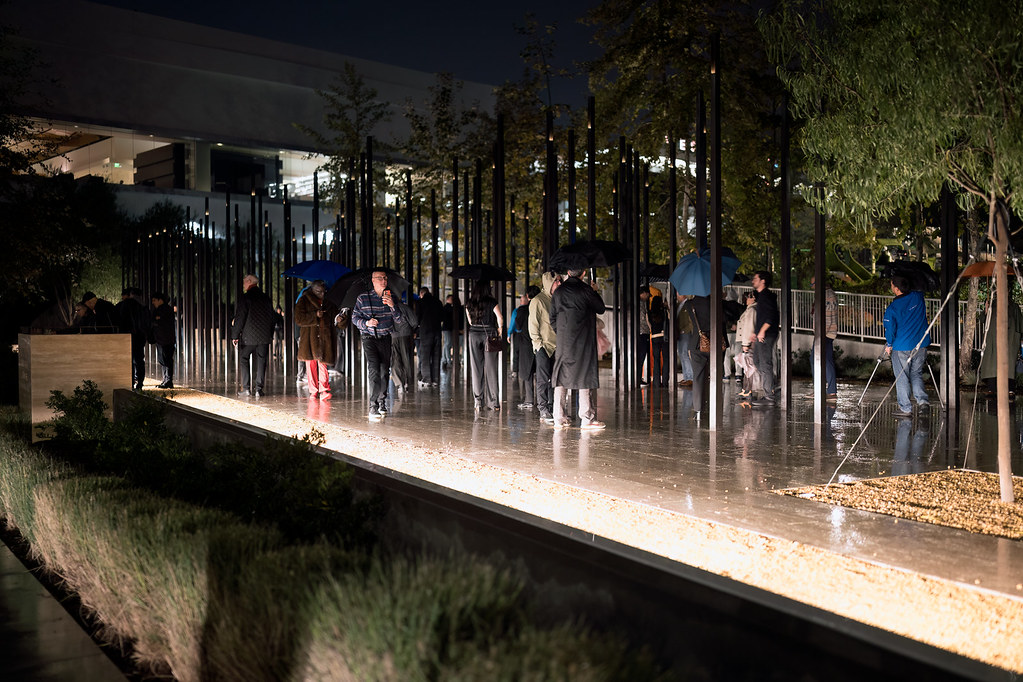
It was 1985, at the height of the AIDS crisis, when Irwin Rappaport came out as gay. As he came to terms with his identity, he witnessed people around him grow weaker: their faces becoming gaunt, painful lesions developing on their bodies. Five years later, he began volunteering as a young lawyer at the Whitman-Walker Clinic, a community health hotspot in Washington, D.C. that created the first AIDS hotline in the city, opened homes for patients with AIDS, and distributed materials that promoted safe sex.
The work being done at the clinic was instrumental, essential, and deeply painful. “When you see that sickness and experience that death among your friends and people you know, and when you’re writing wills for people who are much too young in ordinary times — it has an impact,” Rappaport told the Blade. “And even though in 1996 we saw life-saving medications come around, you never forget the sense of fear that permeates your life. The sense of loss.”
Determined to honor and share the legacies of people who died from AIDS, Rappaport joined the Foundation for the AIDS Monument (FAM) board to work towards the organization’s goal of creating a physical monument dedicated to memorializing these histories. FAM treasurer Craig Dougherty first conceived of this project in 2010 and, after 15 years, STORIES: The AIDS Monument is now available to the public for viewing.
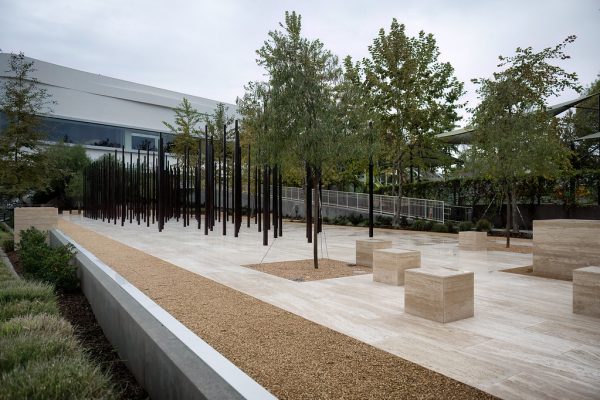
Created in collaboration with the City of West Hollywood, STORIES: The AIDS Monument is composed of 147 vertical bronze pillars known as “traces.” Designed by artist Daniel Tobin, 30 of these traces are engraved with words like: activism, isolation, compassion, and loss, which correlate to the over 125 audio stories collected and archived on the foundation’s website. This multimodal storytelling allows people who come across the monument to engage more intimately with the people represented by these physical pillars.
At nighttime, lights transform the monument into a candlelight vigil, providing a warm glow to a wanderer’s journey through the structure.
When people were able to walk around the traces at Sunday’s grand opening ceremony at the Pacific Design Center, the last remnants of the weekend’s rainstorm created a kind of “spiritual” and reverent atmosphere for those gathering, according to Rappaport. “I think there’s a certain peacefulness and serenity about the design, an opportunity for reflection,” he continued. “For some, it may bring back incredibly painful memories. It might bring back wonderful times with friends who are no longer here. It might remind them of their own caregiving or activism, or the sense of community that they felt in striving with others to get more attention to the disease.”
Now that the monument has been built, FAM has passed the mantle of management and programming to One Institute, a nonprofit that engages community members with queer history through panels, screenings, and other educational initiatives. One Institute plans to host monthly docent tours, art installations, and other special events during various LGBTQ+ national awareness days, including the upcoming World AIDS Day in December.
Rappaport also hopes to do outreach with local schools, so that young students are able to engage with the monument, learn about the people who were affected by the AIDS crisis, and interact with the ripples of transformation that this time period sparked in politics, research, the arts, and within society. “For younger people, I think [this is] an invitation for them to understand how they can organize about issues that they care about,” Rappaport said. “[So] they can see what the HIV and AIDS community did as a model for what they can do to organize and change the world, change culture, change law, change politics, change whatever they think needs to be changed. Because we had no other choice, right?”
West Hollywood
West Hollywood invests $1 million to build LGBTQ+ Olympic hospitality house
Pride House LA/WeHo will be an interactive space for queer athletes and allies to celebrate the 2028 Summer Games together.
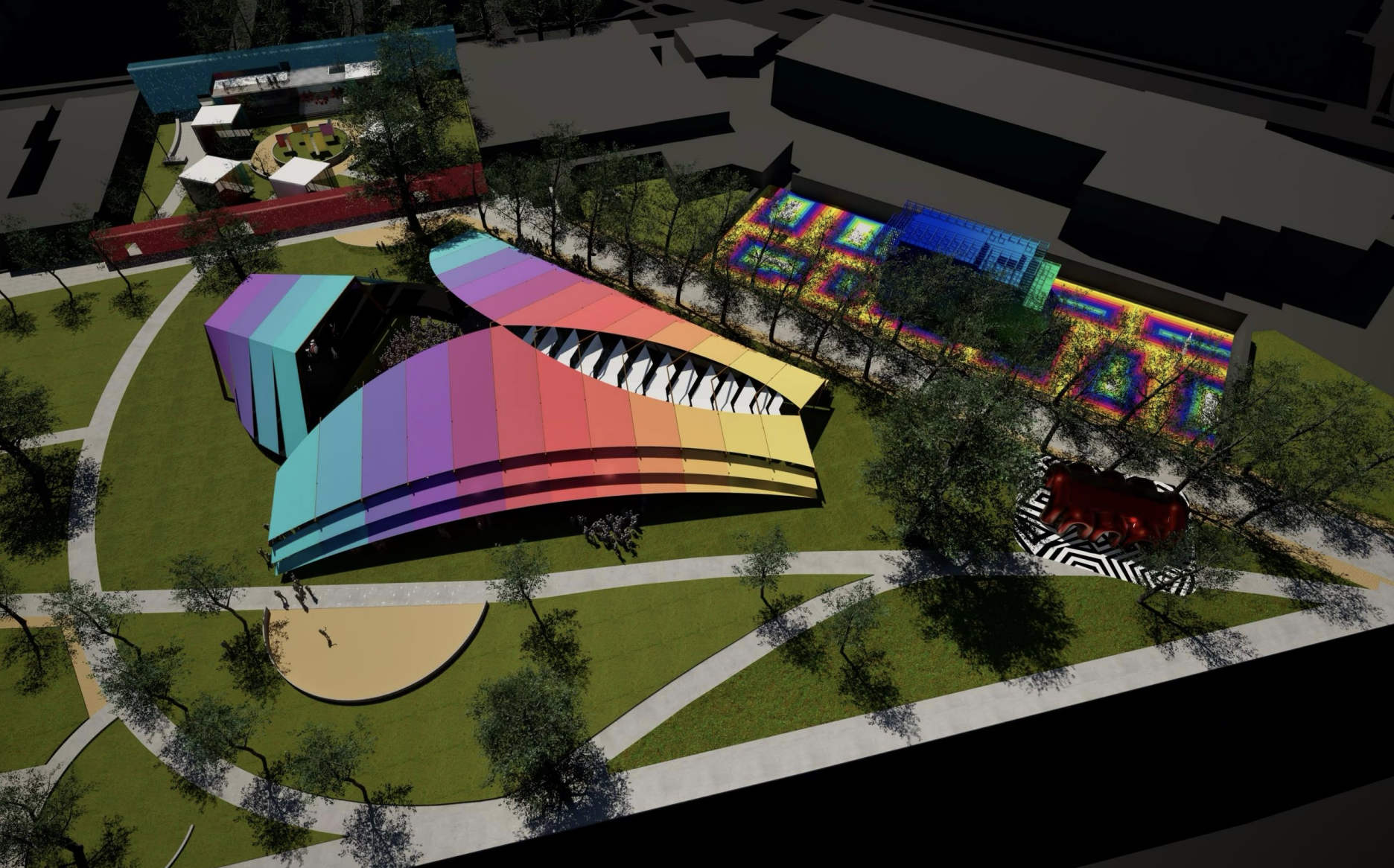
The first-ever Olympic hospitality house began with humble roots in 1992: a tent pitched on the Port of Barcelona for athletes to gather with their families. Since then, they transformed into fixtures of several major sporting events, with hopes of fostering belonging and safety for athletes of various cultural backgrounds.
It wasn’t until 2010 that the first LGBTQ+ hospitality house, the Pride House, appeared during the Winter Olympics in Vancouver. Over the years, its existence and visibility have faced barriers. During the 2014 Sochi Winter Olympic Games in Russia, Pride House International was denied from organizing its safe hub. The rejection was a blow to the visibility and safety that the organization was trying to promote and create for queer athletes. But this didn’t go unnoticed. International fans demonstrated quiet resistance, hosting remote Pride Houses in support of the Olympians who were barred from openly communing and celebrating together.
As Los Angeles prepares to host the Summer Olympics in July 2028, Pride House is coming back stronger than ever. In early October, the West Hollywood city council approved an agreement that would allocate $1 million to sponsor Pride House LA/WeHo as they prepare to build a temporary structure at West Hollywood Park for the 2028 Games. For 17 days, vibrant LGBTQ+ sports programming will fill the park’s grassy knolls.
Pride House LA/WeHo CEO Michael Ferrera detailed at a Nov. 1st Out Athlete Fund fundraising event that the team plans to build a concert stage to seat over 6,000 people. There will also be a museum that will take viewers through 100 years of queer Olympics history, viewing areas for people to watch the games, and a private athlete village for queer Olympians. “The dream of that is — imagine you’re an athlete from a country where you can’t be out,” said Ferrera. “You come here, and you can be safe and sound.”
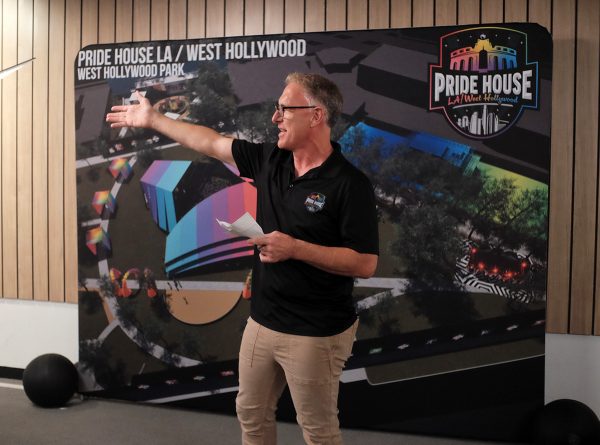
As outlined in the city council agreement and stated by Ferrera, most of the programming will be free and open to the public, and in the heart of a neighborhood that many of the county’s queer residents recognize as their safe haven. “We’re centering this important event in West Hollywood Park where our community has come together for decades in celebration, in protest, to support each other and to live our lives,” Pride House LA/WeHo CEO Michael Ferrera wrote to the Blade. “There is no place that is more representative of inclusion and safe spaces.”
The City of West Hollywood is promoting this inclusion further by asking for local community members to voice their perspectives on the formation of Pride House LA/WeHo at West Hollywood Park. On Monday, a community conversation will take place at Plummer Park to encourage residents to help shape the cultural programming that will take place in the summer of 2028. Another conversation will take place on Nov. 21st at the City’s 40th anniversary of Cityhood event.
“We couldn’t do this without the generosity and partnership of the city of West Hollywood,” Pride House LA/WeHo marketing co-lead Haley Caruso wrote to the Blade. “We are so happy to help bring the Olympic spirit to West Hollywood while also providing the community a safe and entertaining venue to enjoy the Games.”
Head to PrideHouseLAWeho.org for more information
West Hollywood
Drag performers delight Carnaval crowds with demure and daring dances
The Halloween party is one of the most anticipated events for queer Angelenos.
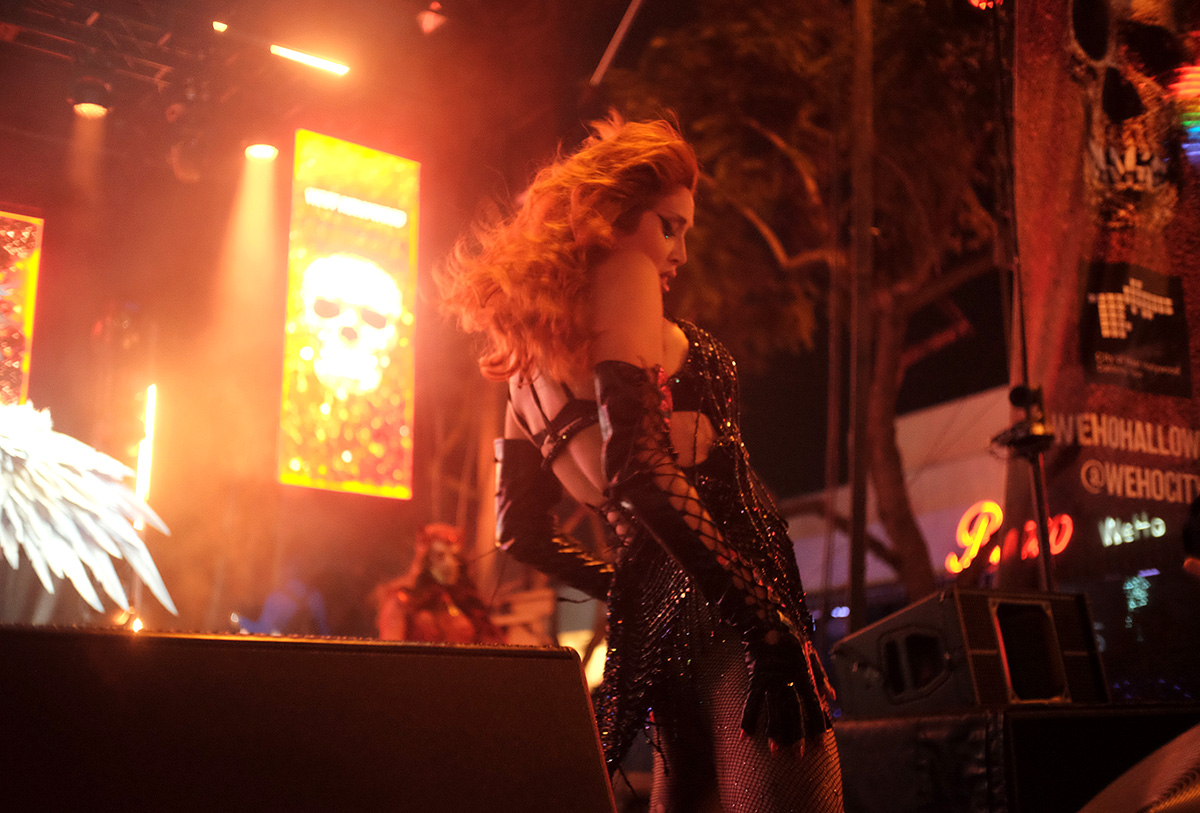
On Friday night, techno pop remixes surged through a tight block on Santa Monica Boulevard, where hundreds of eager partygoers danced near a pop-up stage. Bass-heavy grooves echoed across neighboring streets as Beetlejuices, angels, and vampires swayed and thumped to the beat.
Oct. 31 marked the arrival of West Hollywood’s annual Halloween Carnaval, one of the county’s citywide celebrations — and one of the most anticipated for queer Angelenos.
The first Halloween Carnaval was celebrated in 1987, and has since become one of the most awaited nights for local queer celebration. Drag performers donning elaborate costumes and glamorous makeup set the stage ablaze as they strutted, flipped their hair and danced to the cheers of a crowd that grew enormously as the night went on. The energy was infectious, and the Los Angeles Blade was on the scene to photograph some of these moments.
Image captures by Blade reporter Kristie Song.
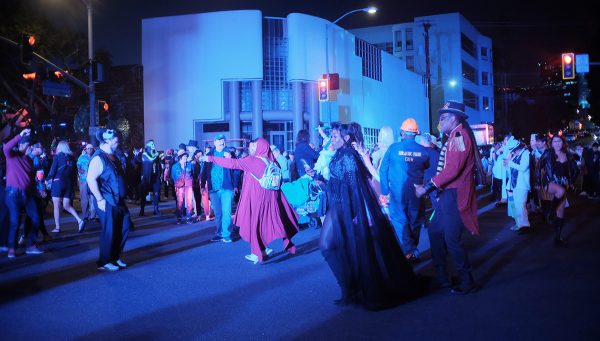
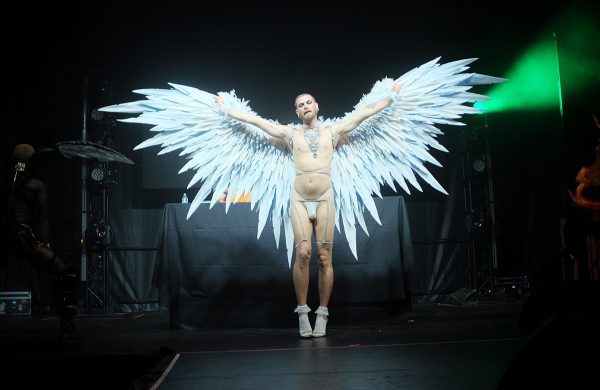
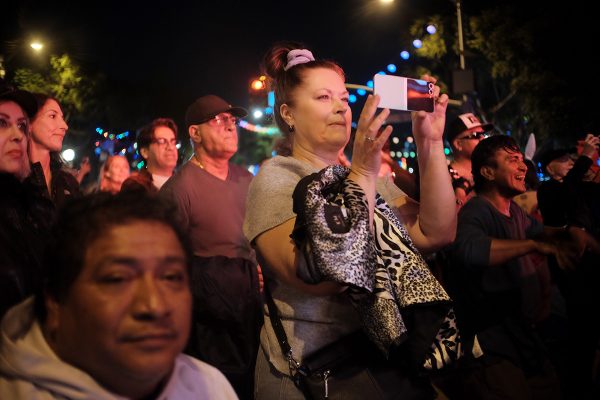
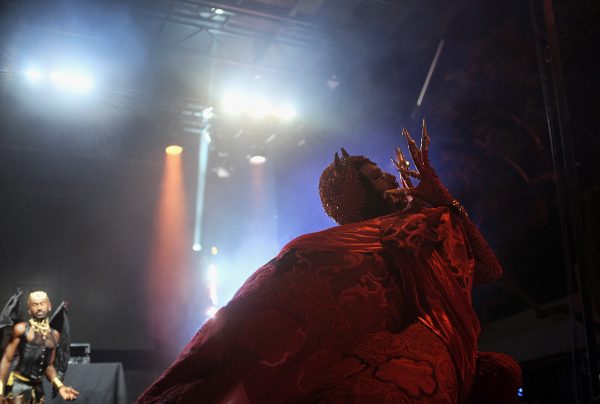
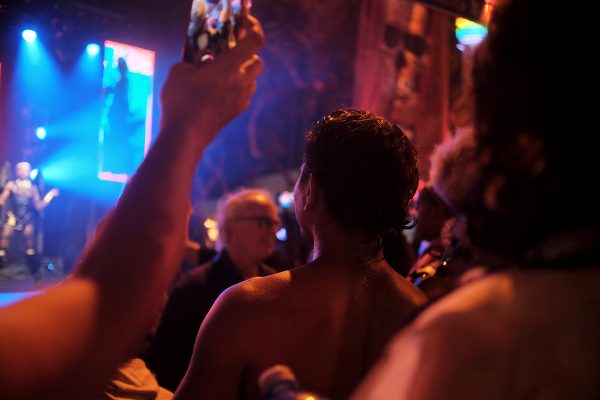
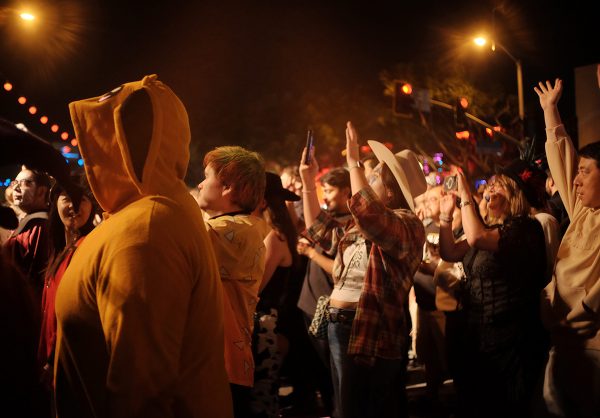
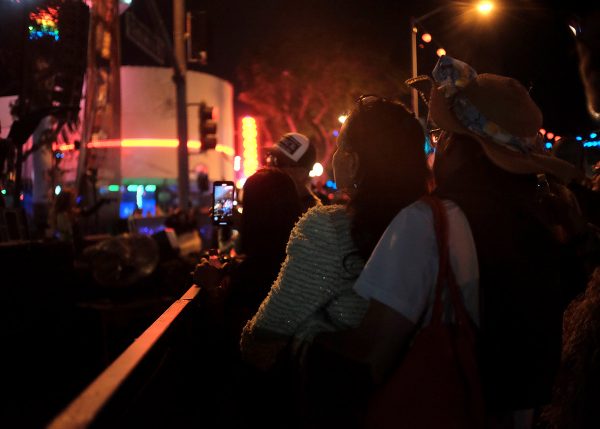
West Hollywood
West Hollywood installs new intersex pride flags on Intersex Awareness Day
On Sunday, city councilmembers gathered to raise two new pride flags to honor intersex community members
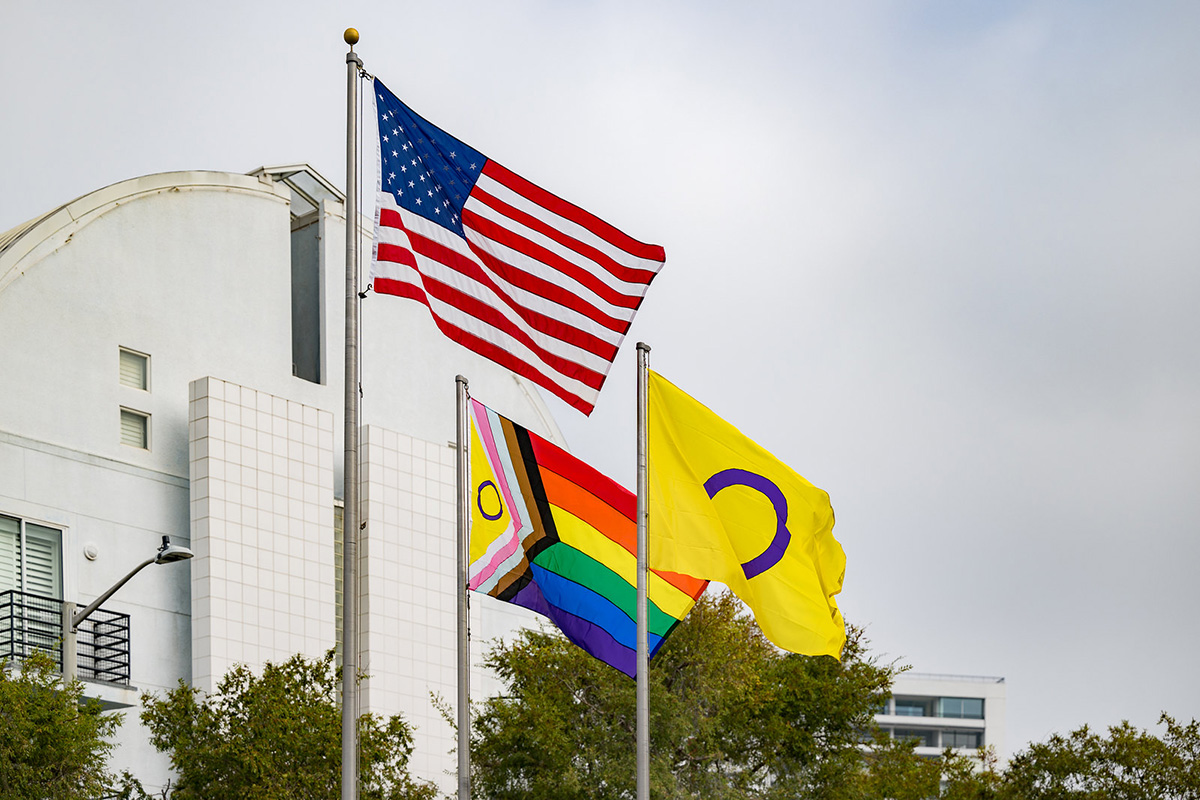
Early yesterday morning, on National Intersex Awareness Day, West Hollywood mayor Chelsea Byers, Vice Mayor John Heilman, as well as councilmembers Danny Hang and John M. Erickson gathered to install and raise two new intersex pride flags. They fly side by side with the American flag, upholding the City of West Hollywood’s vision of solidarity between national pride and LGBTQ+ visibility.
“We are facing unprecedented attacks on our community. It is important that we recognize the entirety of the LGBTQI+ community,” Vice Mayor John Heilman wrote to the Blade. “Intersex people have long been ignored and their issues disregarded. Raising the intersex flag also raises awareness about the challenges many intersex people face.”
Intersex people are born with naturally occurring variations in reproductive and sexual anatomy that don’t fit into binary “male” or “female” categorizations. As Planned Parenthood details, this can look like having both ovarian and testicular tissues or having combinations of chromosomes that aren’t “male” or “female,” just to name a few. According to the Human Rights Campaign Foundation, one of the biggest issues intersex people face is non-consensual surgeries performed when they are children. These operations are considered medically unnecessary and can leave lasting physical and psychological damage on intersex youth.
The fight for bodily autonomy and intersex visibility was the main reason behind the first action organized by intersex advocates and trans allies on Oct. 26th, 1996. Protestors stood outside the Boston Convention Centre, passed out leaflets, and spoke with clinicians, nurses, and other medical professionals attending the annual American Academy of Pediatrics conference.
One of the main leaders behind this movement was Morgan Holmes, an intersex woman who had experienced a violating medical procedure meant to “correct” her anatomy. In May of 1996, she presented testimony in a room adjacent to a symposium on genital surgery for intersex infants, a conference she and other members of her advocacy group had been rejected from.
“What I am saying is that my medical ‘care-givers’ failed to respect my autonomy or my intelligence when they assumed that because I was a child, they could do whatever they wanted as long as my father provided his consent,” Holmes said. “And when I began to balk, instead of questioning their own treatment of me, they blamed my body, and they cut it up.”
Today, intersex people and their stories are more broadly recognized, but still struggle to reach mainstream audiences when it comes to discussions around LGBTQ+ identity. West Hollywood city officials see this addition of intersex pride flags as a step forward. “Updating our city’s flags was my item because visibility matters,” councilmember John M. Erickson wrote to the Blade. “Intersex people have always been part of our story, and it’s time that their history, identity, and pride are recognized in the public spaces that belong to all of us.”
West Hollywood
Residents remain dubious as officials claim “no ICE involvement” at The Abbey
The Oct. 17th “undercover operation” was addressed at the latest city council meeting
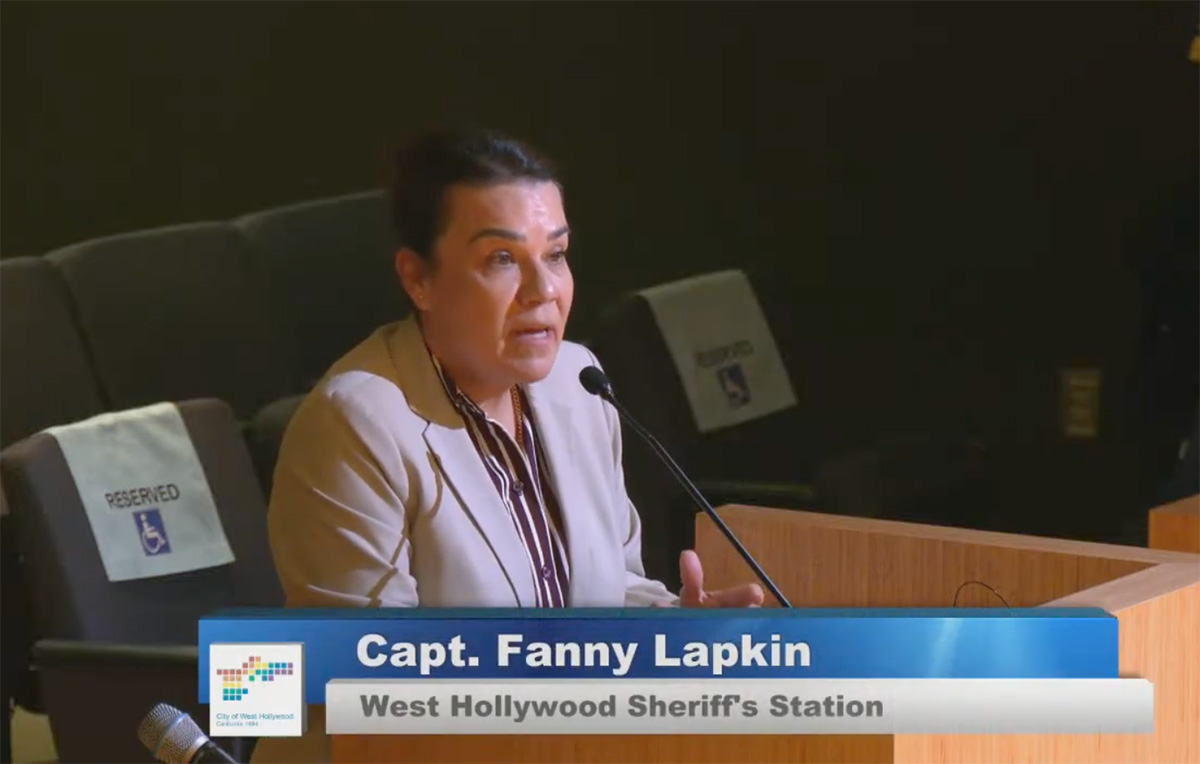
On Friday, Oct. 17th, West Hollywood gay bar The Abbey found itself in the center of a social media storm as clips were shared depicting the presumed presence of federal Immigration and Customs Enforcement (ICE) officers. In a video posted on Oct. 18th by Charles Hernandez, who often creates content around gay nightlife in Los Angeles, several people are seen standing in a line as they are apprehended and handcuffed by officers wearing sheriff’s vests and tees. Hernandez noted that, while dressed in varying attire with the word “sheriff” on it, none of the officers were willing to identify themselves or present their badges upon request.
Hernandez can be heard asking the officers about the cause for arrest, to which one responded: “I don’t have to tell you our cause.” The video creator also questioned another officer, who can be seen wearing a gaiter to cover his face. “Isn’t it illegal to wear a mask in California?” Hernandez asked. “He has COVID,” an officer replied. In September, Governor Newsom signed five bills that weakened federal agents’ abilities to access school sites and health facilities, and prohibited them from hiding their identities. More specifically, SB 627 requires all California law enforcement agencies to create written policies limiting their officers’ use of facial coverings by July 1, 2026.
As this video circulated around the web, the West Hollywood Sheriff’s Station released an online statement of their own, denying allegations that the officers present were federal immigration officers. The station also claimed that the night’s events were a result of an “undercover operation” that was conducted in response to reports made about pickpocketing and the transportation, use, and sale of illegal substances. “Several arrests were made,” the statement read. “ICE was not involved.”
Still, residents remained unconvinced, criticizing the station’s lack of transparency, careful conduct, and accountability. Over 50 people took to the comments of this statement to voice their discontent. “[It] was not that long ago when officers would raid LGBTQ spaces and arrest people simply for being there,” one comment read. “A raid such as this does not inspire feelings of safety for our community. Especially in times when people are being kidnapped off the street by masked federal agents. There simply must be a better response to pickpockets and “other criminal activity” than undercover raids by masked officers and transporting detainees in unmarked vehicles. DO BETTER.”
Two days later, at the West Hollywood city council meeting, West Hollywood Sheriff’s Station Captain Fanny Lapkin took to the podium to address some of these concerns. Echoing the station’s Instagram statement, Lapkin confirmed that the “pre-planned operation” was created in response to “concerns from our businesses and our community in regards to the pickpocketing, to the narcotics, and also to the illegal vending and some of the criminal activity during illegal vending.” Lapkin also confirmed that no federal agents were present, stating that everyone who took part in the operation was “sheriff’s department personnel.” And because the arrests were made as part of a planned operation, Lapkin further stated that warrants were not “necessary.”
The events were discussed with brevity at the meeting, but community ire has not been dispelled. Several people continue to question the ethics of this undercover operation: Why were the individuals being arrested not clearly told the reason for their detainment? Why were unmarked vehicles present? Why conduct the operation in this way, as Los Angeles neighborhoods continue to stay on high alert over immigration raids? These questions remain unanswered as more specifics about the operation have yet to be released.
-
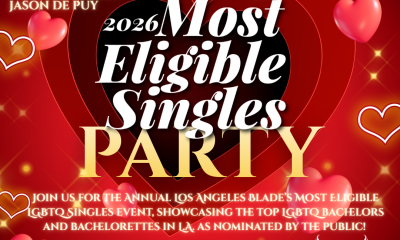
 Bars & Parties5 days ago
Bars & Parties5 days agoSoCal queer singles come together as we celebrate LA’s Top Eligible LGBTQ Singles at the Abbey this Thursday!
-
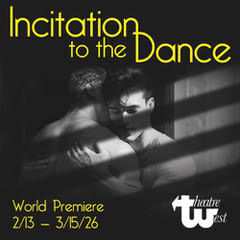
 Theater4 days ago
Theater4 days ago‘Incitation to the Dance’ asks what happens to love when a younger man cuts in
-
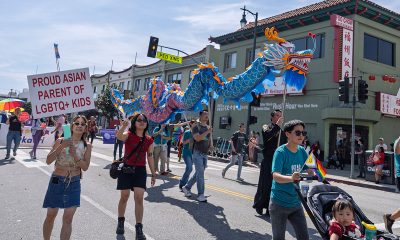
 Features5 days ago
Features5 days agoFrom the Desk of AJSOCAL: How the QTAPI community celebrates Lunar New Year
-

 Puerto Rico5 days ago
Puerto Rico5 days agoBad Bunny shares Super Bowl stage with Ricky Martin, Lady Gaga
-

 New York4 days ago
New York4 days agoPride flag removed from Stonewall Monument as Trump targets LGBTQ landmarks
-

 Philippines4 days ago
Philippines4 days agoPhilippines Supreme Court rules same-sex couples can co-own property
-
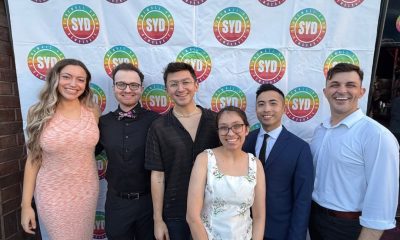
 Los Angeles3 days ago
Los Angeles3 days agoStonewall Young Democrats bounces back from “quiet year” with Hero Awards
-

 Florida4 days ago
Florida4 days agoDisney’s Gay Days ‘has not been canceled’ despite political challenges
-

 Italy5 days ago
Italy5 days agoOlympics Pride House ‘really important for the community’
-
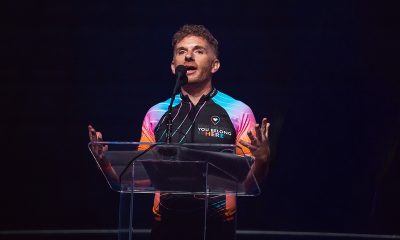
 Los Angeles22 hours ago
Los Angeles22 hours agoA new “queer summer camp” cycling event rises from the legacy of AIDS/LifeCycle

